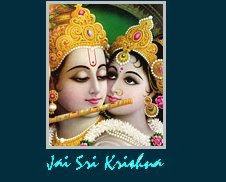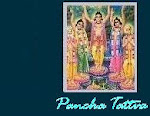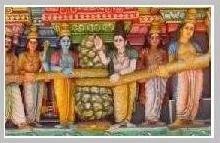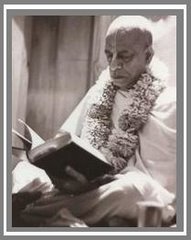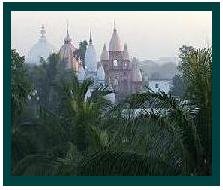
Below is an excerpt from "krsna Book" which is a summery study of the Srimad Bhagwatam. The Srimad Bhagwatam is considered, by all the great sages, to be the ripened fruit of the tree of Vedic wisdom.
5,000 years ago a great thinker by the name Veda Vyasa, being empowered by the Supreme personality of Godhead, scanned the entire Vedic tree of wisdom and extracted only what he felt necessary for the current age.. He then presented it in such a way in that could easily be understood.
I have heard this story directly from ACBSP's dictation tapes. Discrepancies from the spoken word and the written version certainly does exist, but you should get the general idea. Keep in mind that this story is over 5000 years old. - AJD
Salva begged from Lord Siva the gift of an airplane which would be so strong that it could not be destroyed by any demigod, demon, human being, Gandharva, Naga, or even by any Raksasa. Moreover, he desired that the airplane be able to fly anywhere and everywhere he would like to pilot it, and be specifically very dangerous and fearful to the dynasty of the Yadus. Lord Siva immediately agreed to give him the benediction, and Salva took the help of the demon Maya to manufacture this iron airplane, which was so strong and formidable that no one could crash it. It was a very big machine, almost like a big city, and it could fly so high and at such a great speed that it was almost impossible to see where it was, and so there was no question of attacking it. Although it might be dark outside, the pilot could fly it anywhere and everywhere. Having acquired such a wonderful airplane, Salva flew it to the city of Dvaraka, because his main purpose in obtaining the airplane was to attack the city of the Yadus, toward whom he maintained a continual feeling of animosity.
The great heroes of Dvaraka City, headed by commanders such as Pradyumna, counterattacked the soldiers and the airplane of Salva. When he saw the extreme distress of the citizens, Pradyumna immediately arranged his soldiers and personally got upon a chariot, encouraging the citizens by assuring safety. Following his command, many warriors like Satyaki, Carudesna and Samba, all young brothers of Pradyumna, as well as Akrura, Krtavarma, Bhanuvinda, Gada, Suka and Sarana--all came out of the city to fight with Salva. All of them were great fighters; each one could fight with thousands of men. All were fully equipped with necessary weapons and assisted by hundreds and thousands of charioteers, elephants, horses and infantry soldiers. Fierce fighting began between the two parties, exactly as was formerly carried on between the demigods and the demons. The fighting was very severe, and whoever observed the fierce nature of the fight felt his hairs stand on end.
Pradyumna immediately counteracted the mystic demonstration occasioned by the airplane of Salva, the King of Saubha. By the mystic power of the airplane, Salva had created a darkness as dense as night, but Pradyumna all of a sudden appeared like the rising sun. As with the rising of the sun the darkness of night is immediately dissipated, so with the appearance of Pradyumna the power exhibited by Salva became null and void. Each and every one of Pradyumna's arrows had a golden feather at the end, and the shaft was fitted with a sharp iron head. By releasing twenty-five such arrows, Pradyumna severely injured Salva's commander-in-chief. He then released another one hundred arrows toward the body of Salva. After this, he pierced each and every soldier by releasing one arrow, and he killed the chariot drivers by firing ten arrows at each one of them. The carriers like the horses and elephants were killed by the release of three arrows directed toward each one of them. When everyone present on the battlefield saw this wonderful feat of Pradyumna, the great fighters on both the sides began to praise his acts of chivalry.
But still the airplane occupied by Salva was very mysterious. It was so extraordinary that sometimes there would appear to be many airplanes in the sky, and sometimes it would seem that there was none. Sometimes it was visible, and sometimes it was not visible, and the warriors of the Yadu dynasty became puzzled about the whereabouts of the peculiar airplane. Sometimes they would see the airplane on the ground, and sometimes they would see it flying in the sky. Sometimes they would see the airplane resting on the peak of a hill, and sometimes it was seen floating on the water. The wonderful airplane was flying in the sky like a firefly in the wind--it was not steady even for a moment. But despite the mysterious maneuvering of the airplane, the commanders and the soldiers of the Yadu dynasty would immediately rush toward Salva wherever he was present with his airplane and soldiers. The arrows released by the dynasty of the Yadus were as brilliant as the sun and as dangerous as the tongues of serpents. All the soldiers fighting on behalf of Salva became soon distressed by the incessant release of arrows upon them by the heroes of the Yadu dynasty, and Salva himself became unconscious from the attack of these arrows.
The soldiers and the fighters fighting on behalf of Salva were also very strong, and the release of their arrows also harassed the heroes of the Yadu dynasty. But still the Yadus were so strong and determined that they did not move from their strategic positions. The heroes of the Yadu dynasty were determined to either die in the battlefield or gain victory. They were confident of the fact that if they died in the fighting they would attain a heavenly planet, and if they were to came out victorious they would enjoy the world. The name of Salva's commander-in-chief was Dyuman. He was very powerful, and although bitten by twenty-five of Pradyumna's arrows, he suddenly attacked Pradyumna with his fierce club and struck him so strongly that Pradyumna became unconscious. Immediately there was a roaring, "Now he is dead! Now he is dead!" The force of the club on the chest of Pradyumna was very severe, enough to tear asunder the chest of an ordinary man.
Pradyumna's chariot was being driven by the son of Daruka. According to Vedic military principles, the chariot driver and the hero on the chariot have to cooperate during the fighting. As such, it was the duty of the chariot driver to take care of the hero on the chariot during the dangerous and precarious fighting on the battlefield. Thus Daruka removed the body of Pradyumna from the battlefield. Two hours later, in a quiet place, Pradyumna regained his consciousness, and when he saw that he was in a place other than the battlefield he addressed the charioteer and condemned him.
"Oh, you have done the most abominable act! Why have you removed me from the battlefield? My dear charioteer, I have never heard that anyone in our family was ever removed from the battlefield. None of them left the battlefield while fighting. By this removal you have overburdened me with a great defamation. It will be said that I left the battlefield while fighting was going on. My dear charioteer, I must accuse you--you are a coward and emasculator! Tell me, how can I go before my uncle Balarama and before my father Krsna, and what shall I say before Them? Everyone will talk about me and say that I fled from the fighting place, and if they inquire from me about this, what will be my reply? My sisters-in-law will play jokes upon me with sarcastic words: 'My dear hero, how have you become such a coward? How have you become such a eunuch? How have you become so low in the eyes of the fighters who opposed you?' I think, my dear charioteer, that you have committed a great offense by removing me from the battlefield."
The charioteer of Pradyumna replied, "My dear sir, I wish a long life for you. I think I did not do anything wrong, as it is the duty of the charioteer to help the fighter in the chariot when he is in a precarious condition. My dear sir, you are completely competent in the battlefield activities. It is the mutual duty of the charioteer and the warrior to give protection to each other in a precarious condition. I was completely aware of the regulative principles of fighting, and I did my duty. The enemy all of a sudden struck you with his club so severely that you lost consciousness. You were in a dangerous position, surrounded by your enemies. Therefore I was obliged to act as I did."
5,000 years ago a great thinker by the name Veda Vyasa, being empowered by the Supreme personality of Godhead, scanned the entire Vedic tree of wisdom and extracted only what he felt necessary for the current age.. He then presented it in such a way in that could easily be understood.
In today's media we so often hear about UFOs especially during the holidays. I believe that the atheistic community would like us to believe that there is no life on other planets. If there were perhaps a spiritual world exists and this creation in fact does have a cause and a purpose other than sensual and social endulgance.
I have heard this story directly from ACBSP's dictation tapes. Discrepancies from the spoken word and the written version certainly does exist, but you should get the general idea. Keep in mind that this story is over 5000 years old. - AJD
"Battle Between Salva and the Yadu Dynasty."
Salva begged from Lord Siva the gift of an airplane which would be so strong that it could not be destroyed by any demigod, demon, human being, Gandharva, Naga, or even by any Raksasa. Moreover, he desired that the airplane be able to fly anywhere and everywhere he would like to pilot it, and be specifically very dangerous and fearful to the dynasty of the Yadus. Lord Siva immediately agreed to give him the benediction, and Salva took the help of the demon Maya to manufacture this iron airplane, which was so strong and formidable that no one could crash it. It was a very big machine, almost like a big city, and it could fly so high and at such a great speed that it was almost impossible to see where it was, and so there was no question of attacking it. Although it might be dark outside, the pilot could fly it anywhere and everywhere. Having acquired such a wonderful airplane, Salva flew it to the city of Dvaraka, because his main purpose in obtaining the airplane was to attack the city of the Yadus, toward whom he maintained a continual feeling of animosity.
The great heroes of Dvaraka City, headed by commanders such as Pradyumna, counterattacked the soldiers and the airplane of Salva. When he saw the extreme distress of the citizens, Pradyumna immediately arranged his soldiers and personally got upon a chariot, encouraging the citizens by assuring safety. Following his command, many warriors like Satyaki, Carudesna and Samba, all young brothers of Pradyumna, as well as Akrura, Krtavarma, Bhanuvinda, Gada, Suka and Sarana--all came out of the city to fight with Salva. All of them were great fighters; each one could fight with thousands of men. All were fully equipped with necessary weapons and assisted by hundreds and thousands of charioteers, elephants, horses and infantry soldiers. Fierce fighting began between the two parties, exactly as was formerly carried on between the demigods and the demons. The fighting was very severe, and whoever observed the fierce nature of the fight felt his hairs stand on end.
Pradyumna immediately counteracted the mystic demonstration occasioned by the airplane of Salva, the King of Saubha. By the mystic power of the airplane, Salva had created a darkness as dense as night, but Pradyumna all of a sudden appeared like the rising sun. As with the rising of the sun the darkness of night is immediately dissipated, so with the appearance of Pradyumna the power exhibited by Salva became null and void. Each and every one of Pradyumna's arrows had a golden feather at the end, and the shaft was fitted with a sharp iron head. By releasing twenty-five such arrows, Pradyumna severely injured Salva's commander-in-chief. He then released another one hundred arrows toward the body of Salva. After this, he pierced each and every soldier by releasing one arrow, and he killed the chariot drivers by firing ten arrows at each one of them. The carriers like the horses and elephants were killed by the release of three arrows directed toward each one of them. When everyone present on the battlefield saw this wonderful feat of Pradyumna, the great fighters on both the sides began to praise his acts of chivalry.
But still the airplane occupied by Salva was very mysterious. It was so extraordinary that sometimes there would appear to be many airplanes in the sky, and sometimes it would seem that there was none. Sometimes it was visible, and sometimes it was not visible, and the warriors of the Yadu dynasty became puzzled about the whereabouts of the peculiar airplane. Sometimes they would see the airplane on the ground, and sometimes they would see it flying in the sky. Sometimes they would see the airplane resting on the peak of a hill, and sometimes it was seen floating on the water. The wonderful airplane was flying in the sky like a firefly in the wind--it was not steady even for a moment. But despite the mysterious maneuvering of the airplane, the commanders and the soldiers of the Yadu dynasty would immediately rush toward Salva wherever he was present with his airplane and soldiers. The arrows released by the dynasty of the Yadus were as brilliant as the sun and as dangerous as the tongues of serpents. All the soldiers fighting on behalf of Salva became soon distressed by the incessant release of arrows upon them by the heroes of the Yadu dynasty, and Salva himself became unconscious from the attack of these arrows.
The soldiers and the fighters fighting on behalf of Salva were also very strong, and the release of their arrows also harassed the heroes of the Yadu dynasty. But still the Yadus were so strong and determined that they did not move from their strategic positions. The heroes of the Yadu dynasty were determined to either die in the battlefield or gain victory. They were confident of the fact that if they died in the fighting they would attain a heavenly planet, and if they were to came out victorious they would enjoy the world. The name of Salva's commander-in-chief was Dyuman. He was very powerful, and although bitten by twenty-five of Pradyumna's arrows, he suddenly attacked Pradyumna with his fierce club and struck him so strongly that Pradyumna became unconscious. Immediately there was a roaring, "Now he is dead! Now he is dead!" The force of the club on the chest of Pradyumna was very severe, enough to tear asunder the chest of an ordinary man.
Pradyumna's chariot was being driven by the son of Daruka. According to Vedic military principles, the chariot driver and the hero on the chariot have to cooperate during the fighting. As such, it was the duty of the chariot driver to take care of the hero on the chariot during the dangerous and precarious fighting on the battlefield. Thus Daruka removed the body of Pradyumna from the battlefield. Two hours later, in a quiet place, Pradyumna regained his consciousness, and when he saw that he was in a place other than the battlefield he addressed the charioteer and condemned him.
"Oh, you have done the most abominable act! Why have you removed me from the battlefield? My dear charioteer, I have never heard that anyone in our family was ever removed from the battlefield. None of them left the battlefield while fighting. By this removal you have overburdened me with a great defamation. It will be said that I left the battlefield while fighting was going on. My dear charioteer, I must accuse you--you are a coward and emasculator! Tell me, how can I go before my uncle Balarama and before my father Krsna, and what shall I say before Them? Everyone will talk about me and say that I fled from the fighting place, and if they inquire from me about this, what will be my reply? My sisters-in-law will play jokes upon me with sarcastic words: 'My dear hero, how have you become such a coward? How have you become such a eunuch? How have you become so low in the eyes of the fighters who opposed you?' I think, my dear charioteer, that you have committed a great offense by removing me from the battlefield."
The charioteer of Pradyumna replied, "My dear sir, I wish a long life for you. I think I did not do anything wrong, as it is the duty of the charioteer to help the fighter in the chariot when he is in a precarious condition. My dear sir, you are completely competent in the battlefield activities. It is the mutual duty of the charioteer and the warrior to give protection to each other in a precarious condition. I was completely aware of the regulative principles of fighting, and I did my duty. The enemy all of a sudden struck you with his club so severely that you lost consciousness. You were in a dangerous position, surrounded by your enemies. Therefore I was obliged to act as I did."
